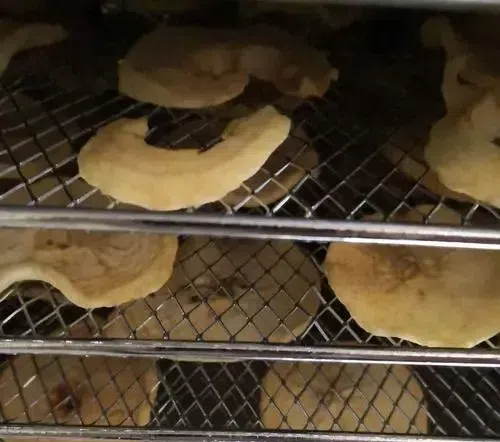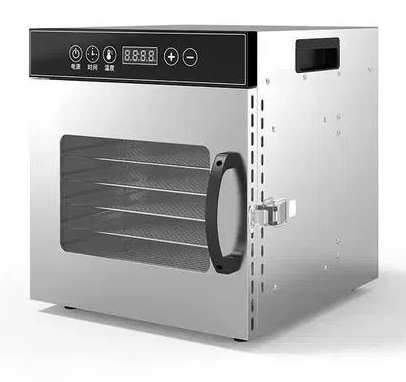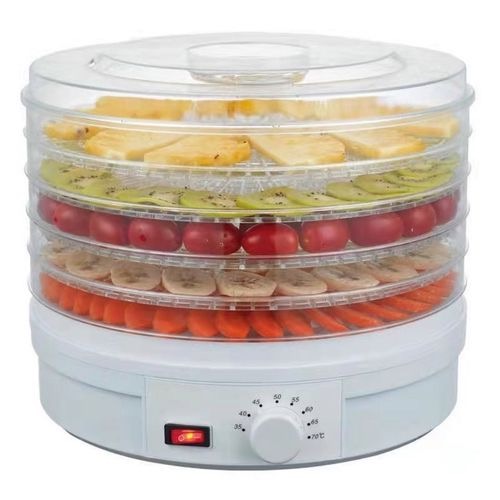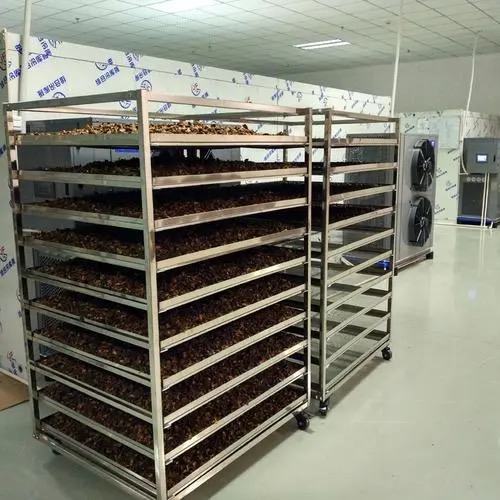
Content Menu
● Introduction to Fruit Dryer Machines
● The Rising Popularity of Food Dehydrators in Singapore
● Types of Fruit Dryer Machines Available in Singapore
>> 1. Home Fruit Dehydrators
>> 2. Commercial Fruit Dryers
>> 3. Industrial Food Dehydration Machines
● Key Features to Consider When Choosing a Fruit Dryer Machine
>> 1. Capacity and Size
>> 2. Material and Construction
>> 3. Temperature Control and Distribution
>> 4. Energy Efficiency
>> 5. Portability and Storage
● Benefits of Using a Fruit Dryer Machine
>> 1. Extended Shelf Life
>> 2. Preservation of Nutritional Value
>> 3. Enhanced Flavors
>> 4. Cost Savings
>> 5. Reduced Food Waste
● Popular Fruit Dryer Machine Brands in Singapore
● Tips for Using Your Fruit Dryer Machine Effectively
>> 1. Proper Preparation
>> 2. Optimal Temperature Settings
>> 3. Proper Spacing
>> 4. Rotation and Checking
>> 5. Proper Storage
● Exploring Vegetable Drying Equipment
● The Future of Fruit Preservation Techniques
● Conclusion
● Frequently Asked Questions
>> 1. What is the average drying time for fruits in a dehydrator?
>> 2. Can I use a fruit dryer machine to make fruit leather?
>> 3. How long do home-dried fruits last?
>> 4. Are there any fruits that shouldn't be dried in a dehydrator?
>> 5. Can I use a fruit dryer machine for other purposes besides drying fruits and vegetables?
Introduction to Fruit Dryer Machines
In the bustling city-state of Singapore, where fresh produce is abundant and culinary innovation thrives, fruit dryer machines have become increasingly popular among both home cooks and commercial food producers. These versatile appliances, also known as food dehydrators, offer a convenient and efficient way to preserve fruits, vegetables, and other foods while retaining their nutritional value and enhancing their flavors.
The Rising Popularity of Food Dehydrators in Singapore
Singapore's tropical climate and diverse food culture have contributed to the growing demand for food dehydration equipment. As health-conscious consumers seek ways to extend the shelf life of their favorite fruits and create nutritious snacks, the market for fruit dryer machines has expanded significantly. From compact home fruit dehydrators to industrial-scale food dehydration machines, there's a wide range of options available to suit various needs and preferences.

Types of Fruit Dryer Machines Available in Singapore
1. Home Fruit Dehydrators
For individuals and families looking to preserve small batches of fruits and vegetables, home fruit dehydrators are an excellent choice. These compact appliances typically feature multiple trays and adjustable temperature settings, allowing users to dry various types of produce with ease. Many models available in Singapore are designed to be energy-efficient, helping users save on electricity costs while producing high-quality dried fruits.
2. Commercial Fruit Dryers
Businesses in the food industry, such as restaurants, cafes, and health food stores, often opt for commercial fruit dryers. These larger machines can handle greater quantities of produce and offer more advanced features, such as precise temperature control and timer functions. Commercial fruit dryers are ideal for creating dried fruit snacks, ingredients for baked goods, or preserving seasonal fruits for year-round use.
3. Industrial Food Dehydration Machines
For large-scale food production, industrial food dehydration machines are the go-to choice. These high-capacity systems are designed to handle substantial volumes of fruits, vegetables, and other food products. Industrial dehydrators often incorporate advanced technologies like hot air circulation and adjustable air divider plates to ensure even drying and consistent results.
Key Features to Consider When Choosing a Fruit Dryer Machine
1. Capacity and Size
When selecting a fruit dryer machine in Singapore, it's essential to consider the amount of produce you plan to dehydrate regularly. Home users may find that a compact, multi-layer fruit drying machine with 4-10 trays is sufficient for their needs. On the other hand, commercial operations might require larger, industrial-grade dehydrators with dozens of trays or continuous belt systems.
2. Material and Construction
The durability and food safety of your fruit dryer machine depend largely on its construction materials. Many high-quality dehydrators feature stainless steel components, which are easy to clean and resistant to corrosion. Some models also incorporate BPA-free plastic parts for added safety and longevity.
3. Temperature Control and Distribution
Precise temperature control is crucial for achieving optimal results when drying different types of fruits and vegetables. Look for fruit dryer machines that offer adjustable temperature settings and even heat distribution throughout the drying chamber. This ensures that your produce dries uniformly, preserving its flavor and nutritional content.
4. Energy Efficiency
As energy costs continue to rise, choosing an energy-efficient food dryer becomes increasingly important. Many modern fruit dryer machines are designed with energy-saving features, such as efficient heating elements and insulated chambers, to minimize power consumption without compromising performance.
5. Portability and Storage
For those with limited kitchen space or who need to move their dehydrator frequently, portability is an important consideration. Some fruit dryer machines in Singapore are designed to be compact and lightweight, making them easy to store when not in use or transport between locations.

Benefits of Using a Fruit Dryer Machine
1. Extended Shelf Life
One of the primary advantages of using a fruit dryer machine is the ability to extend the shelf life of fresh produce significantly. By removing moisture from fruits and vegetables, dehydrators inhibit the growth of bacteria, mold, and other microorganisms that cause spoilage. This allows you to enjoy your favorite fruits long after their peak season has passed.
2. Preservation of Nutritional Value
Unlike some other preservation methods, fruit drying helps retain much of the original nutritional content of the produce. The gentle drying process preserves vitamins, minerals, and antioxidants, making dried fruits a healthy and convenient snack option.
3. Enhanced Flavors
Dehydration concentrates the natural sugars and flavors in fruits, resulting in intensely flavorful dried products. This makes dried fruits an excellent ingredient for baking, cooking, or enjoying as a standalone snack.
4. Cost Savings
By dehydrating fruits and vegetables at home or in your business, you can take advantage of seasonal produce when it's most abundant and affordable. This allows you to stock up on your favorite fruits and enjoy them year-round without the high costs associated with out-of-season fresh produce.
5. Reduced Food Waste
Fruit dryer machines provide an excellent solution for reducing food waste. Instead of letting excess fruits and vegetables spoil, you can dehydrate them for future use, ensuring that nothing goes to waste.
Popular Fruit Dryer Machine Brands in Singapore
Several reputable brands offer high-quality fruit dryer machines in Singapore. Some of the most popular options include:
1. Excalibur: Known for their durable and efficient dehydrators, Excalibur offers a range of models suitable for both home and commercial use.
2. Tribest: This brand specializes in health-conscious appliances, including energy-efficient food dehydrators with advanced features.
3. BioChef: BioChef produces a variety of food dehydrators, from compact home models to larger commercial units, all designed with user-friendly features.
4. Morphy Richards: This well-known brand offers affordable and reliable food dehydrators suitable for home use in Singapore.
5. Septree: Specializing in stainless steel food dehydrators, Septree provides durable and high-capacity options for commercial users.
Tips for Using Your Fruit Dryer Machine Effectively
1. Proper Preparation
To achieve the best results with your fruit dryer machine, it's essential to prepare your produce properly. Wash and dry fruits thoroughly, and slice them into uniform pieces to ensure even drying. For fruits that tend to brown, such as apples or bananas, consider pre-treating them with lemon juice or ascorbic acid solution.
2. Optimal Temperature Settings
Different fruits require different drying temperatures for the best results. Generally, softer fruits like berries dry well at lower temperatures (around 35°C to 40°C), while denser fruits like apples or pears may require higher temperatures (45°C to 55°C). Consult your fruit dryer machine's manual for specific recommendations.
3. Proper Spacing
Arrange fruit slices on the dehydrator trays with enough space between them to allow for proper air circulation. Overcrowding can lead to uneven drying and potentially trap moisture, which may result in spoilage.
4. Rotation and Checking
For optimal results, rotate the trays in your fruit dryer machine periodically during the drying process. This ensures that all pieces dry evenly, especially if your dehydrator doesn't have a built-in fan for air circulation. Check the progress of your fruits regularly and remove any pieces that have finished drying to prevent over-drying.
5. Proper Storage
Once your fruits are fully dehydrated, allow them to cool completely before storing. Pack the dried fruits in airtight containers or vacuum-sealed bags to protect them from moisture and air. Store in a cool, dark place for maximum shelf life.
Exploring Vegetable Drying Equipment
While fruit dryer machines are excellent for preserving fruits, many models are equally adept at drying vegetables. Vegetable drying equipment often features the same core technologies as fruit dehydrators, making them versatile tools for food preservation enthusiasts.Some popular vegetables to dry include:
1. Tomatoes
2. Bell peppers
3. Carrots
4. Mushrooms
5. Onions
6. Zucchini
7. Green beans
Dried vegetables can be used in soups, stews, and other dishes, providing concentrated flavors and nutrients while taking up minimal storage space.
The Future of Fruit Preservation Techniques
As technology continues to advance, we can expect to see further innovations in fruit preservation techniques and fruit dryer machine designs. Some emerging trends include:
1. Smart dehydrators with mobile app integration for remote monitoring and control
2. Improved energy efficiency through advanced heating elements and insulation materials
3. Incorporation of UV sterilization technology for enhanced food safety
4. Development of hybrid dehydrator-air fryer appliances for increased versatility
5. Use of sustainable materials in dehydrator construction to reduce environmental impact
These advancements promise to make fruit drying even more accessible, efficient, and eco-friendly for both home users and commercial operations in Singapore.
Conclusion
Fruit dryer machines have become an indispensable tool for food preservation enthusiasts and businesses alike in Singapore. From compact home fruit dehydrators to industrial-scale food dehydration machines, these versatile appliances offer numerous benefits, including extended shelf life, preserved nutritional value, and enhanced flavors.
As the demand for healthy, convenient snacks continues to grow, fruit dryer machines are likely to play an increasingly important role in Singapore's culinary landscape. Whether you're a home cook looking to preserve your garden's bounty or a business owner seeking to expand your product line, investing in a high-quality fruit dryer machine can open up a world of possibilities for creating delicious and nutritious dried fruits and vegetables.

Frequently Asked Questions
1. What is the average drying time for fruits in a dehydrator?
Answer: The drying time for fruits can vary depending on the type of fruit, its water content, and the dehydrator's settings. On average, most fruits take between 6 to 16 hours to dry completely. Berries and thinly sliced fruits may dry in as little as 6-8 hours, while denser fruits like apples or pears can take 10-16 hours.
2. Can I use a fruit dryer machine to make fruit leather?
Answer: Yes, many fruit dryer machines are suitable for making fruit leather. To make fruit leather, puree your chosen fruits, spread the mixture thinly on dehydrator trays lined with non-stick sheets, and dry at a low temperature (around 57°C) for 4-8 hours or until the leather is pliable but not sticky.
3. How long do home-dried fruits last?
Answer: When properly dried and stored in airtight containers in a cool, dark place, home-dried fruits can last anywhere from 6 months to a year. Some fruits, like raisins, can last even longer. The shelf life can be extended by storing dried fruits in the refrigerator or freezer.
4. Are there any fruits that shouldn't be dried in a dehydrator?
Answer: While most fruits can be successfully dried, some are not ideal for dehydration due to their high fat or water content. Avocados, for example, are not suitable for drying due to their high fat content. Very juicy fruits like watermelon can be challenging to dry effectively and may not yield satisfactory results.
5. Can I use a fruit dryer machine for other purposes besides drying fruits and vegetables?
Answer: Yes, fruit dryer machines are versatile appliances that can be used for various purposes. In addition to fruits and vegetables, you can use them to dry herbs, make jerky, dry flowers for crafts, or even create homemade pet treats. Some people also use their dehydrators to proof bread dough or make yogurt, depending on the model's features.












